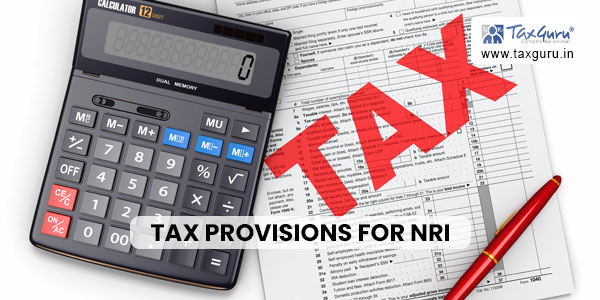Combined Study of Section 115C, 115D,115E, 115F & 115H of the Income Tax Act Applicable to Non-Resident Indian (NRI)
This article provide an insight knowledge about the Special provisions of the Income Tax which are applicable to Non-resident income with respect to certain income as prescribed in Chapter XII-A of the Income Tax Act. These provisions provide benefit to Non-Resident Indian to claim benefit of special rate of taxation on certain income generated from the “specified assets” even after becoming resident by intimating to assessing officer and availing an option at the time of filing ITR.

Non-Resident Indian
“Non-resident Indian” means an individual, being a citizen of India or a person of Indian origin who is not a “resident”.
A person shall be deemed to be of Indian origin if he, or either of his parents or any of his grand-parents, was born in undivided India;
Let’s discuss about these provisions to bring more clarity and understanding.
(INVESTMENT IN FOREIGN EXCHANGE ASSET & INCOME FROM ABOVE)
SEC 115C
When a Non-resident Indian made an investment under “Foreign exchange asset” in convertible foreign exchange and deriving income in the form of “investment income” from such foreign exchange asset or any “Long term Capital Gain” accruing to the Non-resident Indian which is chargeable under the head “Capital gain” from the transfer of capital asset, being a foreign exchange asset.
Explanation
Foreign Exchange asset- It’s a specified asset which means any of the following:
- Shares in an Indian company.
- Debentures issued by an Indian public company which is not a private company.
- Deposits with a Indian company which is not a private company.
- Any security of the Central Government as defined in clause (2) of section 2 of the Public Debt Act, 1944 (18 of 1944)
- Such other assets as the Central Government may specify in this behalf by notification in the Official Gazette.
Convertible Foreign Exchange- Means foreign exchange which is for the time being treated by the Reserve Bank of India as convertible foreign exchange for the purposes of the Foreign Exchange Management Act,
TAXABILITY OF INCOME OF NON-RESIDENT ARISING FROM FOREIGN EXCHANGE ASSET & EXEMPTION ALLOWED Sec 115D
No deduction allowed-This section states that while computing the Total Income of the Non-Resident in respect of the income generated from the “Foreign exchange asset” specified under Sec 115C, no deduction in respect of any expenditure or allowance shall be allowed.
Taxability – Sec 115E deals with the rate of taxation on the income generated from the Foreign exchange asset which are as follows:
- Investment income in the form of dividend, interest, etc from the foreign exchange asset- Taxable @ 20%
- Long term capital gain from the transfer of an asset other than foreign exchange asset– Taxable @ 20%
- Long term Capital Gain arising from the transfer of Foreign exchange asset- Taxable @ 10%
SEC 115F (EXEMPTION ALLOWED)
Where the Non-resident Indian invests the proceeds of the “Net sale consideration” arising from the transfer of Foreign Exchange asset in the following manner:
- Made investment in specified asset as prescribed under Sec 115C (explained above)
- Made investment in Saving certificate referred to in clause (4B) of Section 10.
Then the “Long term capital gain” accruing shall be exempt in the following manner:
- Where Investment in new asset = Net Sale consideration
- Whole Capital shall be exempt
- Where the Investment in New asset < Net sale Consideration
Long term Capital Gain * Cost of New asset
Net Sale Consideration
SEC 115H (OPTION TO AVAIL BENEFIT IN RESPECT OF FOREIGN EXCHANGE ASSET EVEN AFTER BECOMING RESIDENT)
This section provides the benefit to Non-resident Indian to continue to apply the provision of special rate of taxation in respect of Foreign exchange asset specified under Sec 115C i.e.
- Debentures issued by an Indian public company which is not a private company.
- Deposits with an Indian company which is not a private company
- Any security of the Central Government as defined in clause (2) of section 2 of the Public Debt Act, 1944 (18 of 1944);
- Such other assets as the Central Government may specify in this behalf by notification in the Official Gazette.
Even when a person, who is a non-resident Indian in any previous year, becomes assessable as resident in India in respect of the total income of any subsequent year furnish to the Assessing Officer a declaration in writing along with his return of income under section 139 for the assessment year for which he is so assessable —–
The provisions of this Chapter XII-A of the Income Tax Act shall continue to apply to such person in relation to such income for that assessment year and for every subsequent assessment year until the transfer or conversion (otherwise than by transfer) into money of such assets.






My Son invested in ULIP in 2014 with annual premium of Rs 50000 from NRE. More than 95% of his premiums were invested in equities but on maturity TDS of 31.5% has been deducted. In sch 115 there is mention of TDS on equity MF and 30% on other income. There is no mention of ULIP. can this be right even tho premium of 50000 exceeded 10% of insurance . there is no mention of sum assured in policy